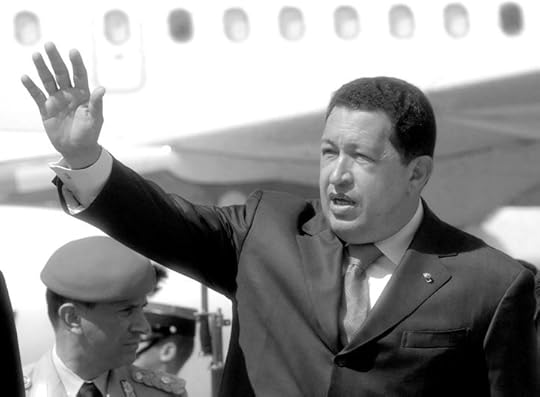Where Things Went Left, Where Things Went South
 (Wikimedia Commons) Caracazo Protests, Venezuela
(Wikimedia Commons) Caracazo Protests, Venezuela These massive protests against economic austerity measures, triggered by a rise in public transport fares in 1989, are often seen as the first major episode of anti-neoliberal resistance in Latin America. Years of economic mismanagement, including reliance on oil revenues and failure to diversify the economy, left Venezuela vulnerable to external shocks. The decline in oil prices in the 1980s and the implementation of austerity policies further strained the economy. High inflation rates eroded purchasing power, making it increasingly difficult for ordinary Venezuelans to afford basic necessities. as the cost of living surged.
Anti-SAPs Protests, AfricaWhile protests against IMF-imposed structural adjustment programs emerged in the mid-1980s, they seemed to reach a crescendo with a so-called ���spring��� of Anti-Structural Adjustment Programs (SAPs) protests erupting across Africa in 1989 and the early 1990s. The International Monetary Fund (IMF) and World Bank mandated austerity policies that cut public spending, reduced subsidies, and led to higher unemployment. In Nigeria, Zambia, Benin Republic, Kenya, C��te d���Ivoire, and elsewhere student activists, labor unions, and community organizations mobilized en masse, demanding an end to these detrimental policies and advocating for a restoration of public subsidies and economic reforms that prioritized social welfare and local development.
Zapatista Uprising, MexicoIn 1994, the Zapatista Army of National Liberation (EZLN) launched an armed uprising against the North American Free Trade Agreement (NAFTA) and neoliberal policies. The Zapatistas foregrounded indigenous rights, advocating for autonomy, land reform, and cultural recognition, which resonated with marginalized communities across Latin America. The uprising galvanized a broader movement, inspiring various grassroots and ���autonomous��� organizations movements throughout the region to mobilize against neoliberalism.
The ANC���s GEAR Strategy, South AfricaIn 1996, South Africa���s African National Congress (ANC) introduced the Growth, Employment, and Redistribution (GEAR) strategy to enhance South Africa���s integration into the global economy. Leonard Gentle, the director of the Inter-national Labour and Research Information group, remarked that: GEAR marked a crucial turning point in South Africa���s economic policy after apartheid, marking a transition from a form of ���Keynesian racial capitalism, in which the state secured the conditions necessary for accumulation for the capitalist class as a whole based on cheap black labour power, cheap energy, and regulated capitals, to a neoliberal state attempting to open up new arenas for commodification.���
Hugo Ch��vez���s Election, VenezuelaHugo Ch��vez wins the presidency, promoting a revolutionary agenda and Bolivarian socialism. Ch��vez focused on social justice, anti-imperialism, and the redistribution of wealth. While Ch��vez���s policies faced criticism and were riven with contradictions���especially in relation to their ultimately doomed dependence on high oil prices���his legacy influenced subsequent leaders in countries like Bolivia (Evo Morales), Ecuador (Rafael Correa), and Nicaragua (Daniel Ortega), who adopted similar leftist agendas.
���Choice-less��� Electoral Democracy, NigeriaThe return to electoral democracy in 1999 and the administrations of Obasanjo, Yar���adua, and Jonathan (1999���2015) witnessed a revival of the neoliberal economic reform agenda punctuated only by a short-lived slowing down of privatization under Yar���adua. This period also saw a moderate improvement in the civic space, and fifteen years (1999���2014) of steady, if (highly exclusionary) GDP growth, brought about by the same global commodity boom which benefited Latin America���s initial pink tide states. As a rough metric, Nigeria���s GDP per capita witnessed a fivefold increase from $500 in 1999 to $2,500 in 2013.
Economic Crisis, ArgentinaProtests against the government���s policies during the economic crisis included mass demonstrations and the infamous ���cacerolazo��� (pot-banging). The government implemented a fixed exchange rate policy, pegging the Argentine peso to the U.S. dollar. This policy initially stabilized the economy but ultimately led to overvaluation and loss of competitiveness. A banking crisis ensued as people rushed to withdraw their savings. In the aftermath of the crisis, N��stor Kirchner was elected president in 2003, representing a shift towards leftist governance. His administration implemented policies focused on social welfare, human rights, and economic recovery.
Lula da Silva���s election, BrazilIn 2002, Luiz In��cio ���Lula��� da Silva, a former metalworker and trade union leader, was elected president of Brazil on the ticket of the Workers��� Party (PT). While Lula initially moderated some of his economic proposals to reassure financial markets, his administration expanded social welfare programs like Bolsa Fam��lia, increased the minimum wage, and strengthened public health and education systems. Lula���s rise to power was rooted in decades of organizing by Brazil���s trade unions and social movements, including the Landless Workers��� Movement (MST), which had built autonomous systems of political education and alternative economic practice based on ���extra-legal��� occupations of unproductive rural lands.
The Economist���s ���Africa Rising��� Cover, AfricaThe ���Africa rising��� narrative emerged in the early 2000s as a response to the continent���s largely positive GDP growth trajectory. It was inspired by several countries, notably Ethiopia, which experienced rapid economic growth through state-led initiatives; Rwanda, which showcased impressive recovery and development post-genocide; and Ghana, which benefitted from political stability and increased foreign investment. This narrative was popularized by various media outlets, including a landmark cover story in The Economist in 2011. The narrative tended to downplay spiraling poverty and inequality, instead celebrating the liberalization of African economies, the lifting of trade barriers and a moderate rise in foreign investment.
Sean Jacobs's Blog
- Sean Jacobs's profile
- 4 followers



